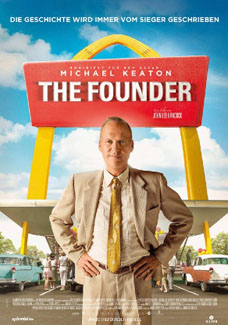 |
| 
USA 2016
Opening April 20, 2017
Directed by: John Lee Hancock
Writing credits: Robert D. Siegel
Principal actors: Michael Keaton, Nick Offerman, John Carroll Lynch, Laura Dern, B.J. Novak
 Feeling expansive, by the 1950s Americans love affair with automobiles was in full bloom. Advantageous for two brothers: their straightforward hamburger-stand serves burgers-only using an innovative assembly line standard, and their concept includes golden arches. Fate deals a hand in the lotto-of-life when the McDonalds’ order milkshake mixers. Flabbergasted, Roy Kroc sets off via Route 66 from his Midwest territory to California to investigate. The ultimate salesman, anxious about his prospects, is intrigued. What Roy sees is the deal breaker, changing his life, and destiny.
Feeling expansive, by the 1950s Americans love affair with automobiles was in full bloom. Advantageous for two brothers: their straightforward hamburger-stand serves burgers-only using an innovative assembly line standard, and their concept includes golden arches. Fate deals a hand in the lotto-of-life when the McDonalds’ order milkshake mixers. Flabbergasted, Roy Kroc sets off via Route 66 from his Midwest territory to California to investigate. The ultimate salesman, anxious about his prospects, is intrigued. What Roy sees is the deal breaker, changing his life, and destiny. Robert D. Siegel’s formative screenplay timeline covers early 1950s to around 1961. John Lee Hancock skillfully directs this fascinating biopic about one dream’s worldwide impact. Energizing the story is Michael Keaton’s (Kroc) extraordinary performance: peddling bulky mixers, suffering small-town drive-in meals and lonely nights in motels arouse our empathy for Kroc. That turns to enthusiasm for Roy’s tenacity, and persistence after meeting the McDonald brothers. John Carroll Lynch (Mac) and Nick Offerman (Dick) epitomize resourceful, loyal, decent men content in their skin and surroundings. Until, the founder: Keaton’s metamorphosis is effortless, perceptive using imbued character traits he develops, intensifies, e.g. exchanges with his wife, a solid Laura Dern. An exemplary supporting cast includes Linda Cardellini, Justin Randell Brooke, Kate Kneeland, and Patrick Wilson.
Robert Frazen’s editing is skillful: enlightening, structured, with engaging sequences moving the story forward, and neatly inserted archival footage. End credits include updates/photos of the main players. Director of Photography John Schwartzman’s use of composition, and color filters/exposure seamlessly carries us through decades. Production Designer Michael Corenblith and everyone involved in sets, costumes—including location scouts, deserve kudos. Carter Burwell’s music is refreshingly original.
Pop artist Andy Warhol’s 1975 philosophy endorsed “McDonaldization,” “The most beautiful thing in Tokyo is McDonald’s. …” The Founder will resonate with global audiences: its ambivalence, its subtextual messages about those early, revolutionizing days before consciousness-raising concerning obesity and diabetes. Ironically, the ultimate dealmaker makes off like a bandit by selling his soul. 115 minutes ()
.

Ray Kroc (Keaton) is a salesman. He travels door to door throughout the American Midwest peddling milkshake mixers. The year is 1954, and no one is buying. It quickly becomes clear that Kroc has traveled this route before, trying time and again to sell people on The Next Big Thing (paper cups, kitchen tables that function like Murphy beds) and time and again without success.
Then, at a pay phone somewhere in Missouri, Kroc learns that a burger joint in California has placed an order for six, make that eight, mixers. Eight? Kroc hops right back into his Plymouth and drives nearly 1700 miles to San Bernardino to see for himself.
That burger joint turns out to be the original McDonald's, run by the brothers Dick (Offerman) and Mac (Carroll), decent all-American guys who just want to deliver burgers, fries and shakes to local families in a fast, efficient way. Kroc - spoiler alert only if there's still a person on earth who's unfamiliar with those Golden Arches - envisions much, much more: "Franchise the damn thing!" Keaton's Kroc practically yells. "From sea to shining sea!"
The film has its shortcomings. Trying to keep what's in essence a business story interesting, the narrative is at times too fast, at times overly dramatic. A scene in which Kroc's love interest mixes a milkshake, for one, is borderline absurd. But The Founder cleverly retells the story of McDonald's origins. While the plot develops mainly from Kroc's vantage point, director Hancock still reveals many of the implicit ironies in Kroc's success and parallels in today's world. Revisionism is in. Kroc wasn't really "The Founder." He just said he was until it stuck.
